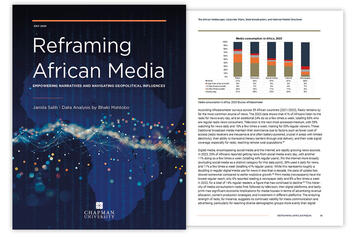
When people think about media, Africa is rarely the first thing that comes to mind. And when it does come up, it is often portrayed through a very narrow lens—poverty, conflict, or outdated stereotypes.
But African media is so much more than that. It is powerful, growing, and deeply influential across music, film, fashion, and even digital innovation. That is why it is important that we start paying attention.
Media serves as the backbone of any democratic society. It informs citizens, holds leaders accountable, and provides a platform for diverse voices. In Africa, media has played a pivotal role in shaping public opinion, influencing political outcomes, and driving social change. However, the media landscape across the continent is as diverse as its cultures, languages, and histories.
In many African countries, media outlets have been instrumental in exposing corruption, advocating for human rights, and promoting transparency. Investigative journalism has uncovered scandals that have led to governmental reforms and, in some cases, the resignation of public officials. Moreover, media has been a tool for education, raising awareness about health issues, environmental concerns, and social injustices.
Yet, the media in Africa faces numerous challenges. Press freedom is often under threat, with journalists facing harassment, censorship, and even violence. Economic constraints limit the reach and quality of media outlets, especially in rural areas. Additionally, the dominance of foreign media narratives often overshadows local voices, leading to a misrepresentation of African realities.
Read and download the full report.
Contributors
Jamila Salih is the primary author of this report. She grew up in Denver, Colorado, and spent some of her high school years in Ethiopia, gaining a unique global perspective early on. She later moved to California for college, where she earned a degree from Chapman University. Jamila now works in marketing consulting at a biotech company — AmplifiDx, combining creativity with strategy to support innovation in the health and science space.
Bheki Mahlobo provided written data anaylsis for this report.
Bheki is an economist and Partner at Frans Cronje Private Clients. He began his career at the Centre for Risk Analysis before joining the financial consulting firm ETM Analytics as a financial analyst. Specialising in economic and financial markets research as well as political trend analysis, Bheki has briefed numerous companies on South Africa’s long-term economic, market, and political outlook. He has drafted an extensive range of analytical notes and reports and he co-author of a chapter in the book The Future of Cities, written in collaboration with Professor Joel Kotkin of the American Enterprise Institute.
Raised in the rural Eastern Cape village of Lupapasi and later relocating to Johannesburg for his schooling, Bheki brings a unique perspective to his work. He is currently pursuing a Masters in Behavioural and Computational Economics at Chapman University, further enhancing his expertise in the field.
Marshall Toplansky wrote the introduction, and Joel Kotkin served as editor for this report.












